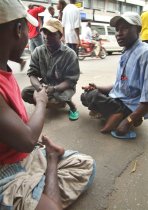-
(单词翻译:双击或拖选)
Kano
11 April 2007
Many polio victims in the northern Nigerian city, Kano, have turned their backs on begging for a living and have set up their own association to provide support to children and adults crippled by the virus. The association has enabled hundreds of polio victims to tackle the disability. Sarah Simpson reports from Kano.

Lawal Manesara, left, discuss with Ali Usman, centre, and sani Bako, right, all polio victims in a street of Lagos, Nigeria, 4 May 2005
Abdulahi Umar swings his body across the floor, with his hands. He lost use of his legs, after he fell ill with polio, as a child.
He reaches up to the car door and. with a few huffs and puffs1, pulls himself up into the driver's seat.
Umar is a taxi driver and, as he cruises smoothly2 through the busy streets of Kano, he explains how his car has been specially3 adapted for his needs.
"The brake is special and the clutch is special. And, accelerator is special, as my legs are not long enough to reach inside, so I construct a little bit of iron," he said.
Umar learned how to adapt his car at the Kano Polio Victims Trust Association, a support group that provides training to hundreds of adults and children crippled by polio.
Polio is a potentially fatal virus that often leaves survivors4 severely5 crippled - usually in the lower limbs.
Although he is unable to walk, being able to work as a taxi driver has given Umar a steady income and sense of freedom.
ULMER: "Most of my customers do not know that I am a disabled. They will enter and drop (leave) without knowing that the driver is disabled. You may not know."
SIMPSON: "How does that make you feel?"
ULMER: "You feel free."
Nigeria is one of a handful of countries in the world where polio is endemic. In 2006, Nigeria accounted for 70 percent of the world's cases of polio, according to figures from the World Health Organization.
Within Nigeria, most polio cases are recorded in the north of the country.
Kano is the biggest city in northern Nigeria. Yet, unlike the situation in many other towns, there is a distinct absence of polio victims begging in the traffic jams.
Aid worker Mohammed Doko says that is because polio victims are learning skills and trades at the Kano Polio Victims Trust Association.
"Begging is no longer profitable. There is not much money in the economy again," he said. "People do not give much any longer. But, if you come to KPVTA, you learn something and then you go away with something and that give you dignity, as now you are no longer begging. You are selling."
Doko works for the community participation6 charity, COMPASS, which is working closely with the polio victims to expand and improve the courses available to association members.
Brightly painted tricycles line the street outside the association headquarters. With help from COMPASS, association members have worked on improving their designs and are now selling their tricycles to vendors7, nationwide.
The carts are just one of a number products made by polio victims, for polio victims.
Even motorbikes are adapted with some ingenious welding - two small wheels are fixed8 to the rear, much like child's training bicycle.
In a good month, polio victim Abdu Hashim sells three or four tricycles, clearing a profit of around $40.
Buyers come from all over Nigeria and from other West African countries.
"People come here to buy from other states or abroad from Ghana, Niger, Cameroon," said Hashim.
There are many skills available through the association, including tie-dye of fabrics9 and making beauty products. With help from COMPASS, polio victims are learning small-business skills.
But help from the association and groups like COMPASS does not protect the polio victims from the day-to-day troubles of life in Nigeria - where most people exist on less than $2 a day.
So, like most of the cars on Kano's roads, Umar's taxi is old and prone10 to breakdown11. But Umar is happy to be just like anyone else.
"I have my own mechanic. Anywhere my car breaks down I will go and call him to go and carry the car and repair it for me," he said.
Umar is the main income earner for himself, his wife and three children. With his specially adapted taxi, he has never had to consider begging to get by.
 收听单词发音
收听单词发音
1
puffs

|
|
| n.吸( puff的名词复数 );(烟斗或香烟的)一吸;一缕(烟、蒸汽等);(呼吸或风的)呼v.使喷出( puff的第三人称单数 );喷着汽(或烟)移动;吹嘘;吹捧 | |
参考例句: |
|
|
|
2
smoothly

|
|
| adv.平滑地,顺利地,流利地,流畅地 | |
参考例句: |
|
|
|
3
specially

|
|
| adv.特定地;特殊地;明确地 | |
参考例句: |
|
|
|
4
survivors

|
|
| 幸存者,残存者,生还者( survivor的名词复数 ) | |
参考例句: |
|
|
|
5
severely

|
|
| adv.严格地;严厉地;非常恶劣地 | |
参考例句: |
|
|
|
6
participation

|
|
| n.参与,参加,分享 | |
参考例句: |
|
|
|
7
vendors

|
|
| n.摊贩( vendor的名词复数 );小贩;(房屋等的)卖主;卖方 | |
参考例句: |
|
|
|
8
fixed

|
|
| adj.固定的,不变的,准备好的;(计算机)固定的 | |
参考例句: |
|
|
|
9
fabrics

|
|
| 织物( fabric的名词复数 ); 布; 构造; (建筑物的)结构(如墙、地面、屋顶):质地 | |
参考例句: |
|
|
|
10
prone

|
|
| adj.(to)易于…的,很可能…的;俯卧的 | |
参考例句: |
|
|
|
11
breakdown

|
|
| n.垮,衰竭;损坏,故障,倒塌 | |
参考例句: |
|
|
|















